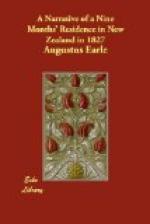We had every reason to fear this might prove a more calamitous affair than any we had yet experienced; as George immediately collected all his family and dependents, and took his departure for the Kawakawa river (the residence of De Kookie, the chief who had come to his assistance against Hongi’s attack), leaving behind only a few slaves. Thus a second time were we left to our own resources on Kororarika Beach. George and his followers were too much scattered: some were trading with the ships, others were distributed in various districts, attending to their agricultural pursuits. Thus separated, each might become an easy prey to any of the powerful chiefs; but, were they united, they would be too strong for any of the tribes: unfortunately the hope of gain made them risk so great a danger. At this period, too, there was not a single vessel in the bay to protect us. The known partiality of all the tribes for Europeans was the only consolation we had; and we endeavoured to cheer each other with this hope, under what in reality might be considered very appalling circumstances.
After enduring this state of suspense and anxiety for several days, and no enemy appearing, we determined to pay a visit to the camp of the combined army of our friends, which would, at the same time, gratify our own curiosity, and give them a degree of satisfaction; as it would prove to them that we were not afraid of venturing amongst them, even in times of danger. We accordingly prepared the whaleboats to proceed up the Kawakawa river; and, as I had never been there before, the present afforded an excellent opportunity for exploring that picturesque spot.
At the top of the Bay of Islands, two rivers disembogue, the Wye Catte and the Kawakawa: they are both small but beautiful streams. It was early in the morning when we started: the dewy mist rose from the unruffled bosom of the river like the gradual lifting up of a curtain, and, at length, displayed its lofty sides, covered with immense trees, the verdure extending to the very edge of the water. All was quiet, beautiful, and serene; the only sounds which broke the calm were the wild notes of the tui (or New Zealand blackbird), the splashing of our own oars, or the occasional flight of a wild duck (or shag), disturbed by our approach.
We rowed our boat many miles without seeing the slightest vestige of any human inhabitants or civilisation: all appeared wild and magnificent as if just fresh from the hands of nature; and it failed not to lead the mind up to the contemplation of the Creator. It seemed utterly impossible to reconcile the idea that such lonely, romantic, and sequestered scenes could conceal hordes of savage cannibals, or that the tranquility of this very place would soon be exchanged for the noise and tumult of savage warfare. We soon reached the village where the coalesced chiefs had taken up their station: they had fortified their position, and were waiting the approach of the enemy. No sooner, however, was our arrival known, than all came running down tumultuously to give us welcome: all business was laid aside to greet our landing, and we were conducted with great ceremony into the centre of the camp.




